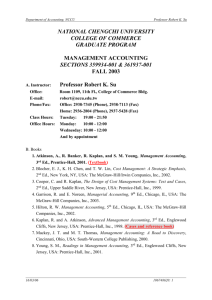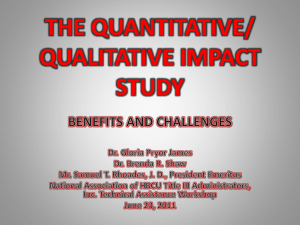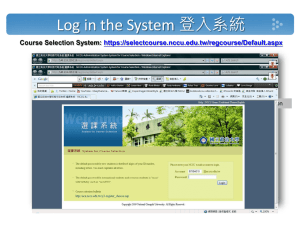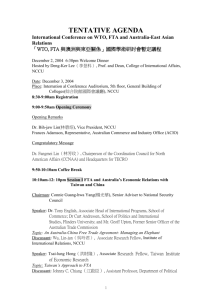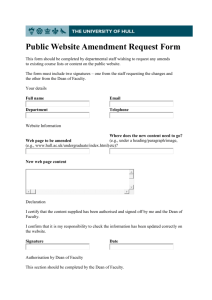2002/2003 ANNUAL REPORT EXECUTIVE SUMMARY “Preparing
advertisement
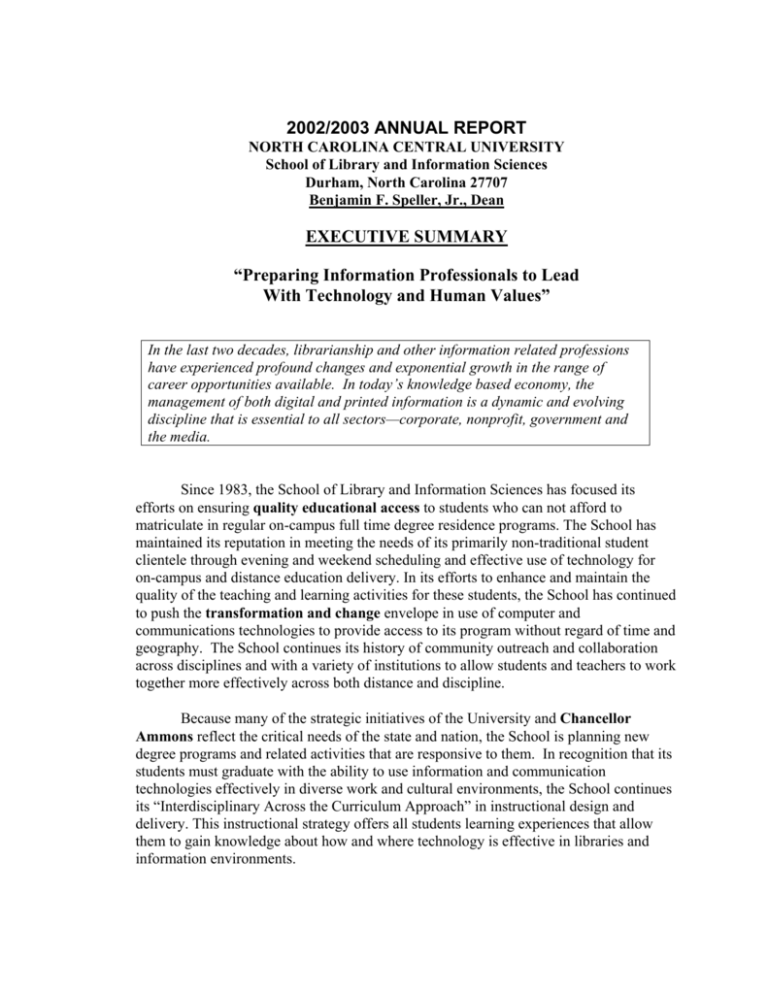
2002/2003 ANNUAL REPORT NORTH CAROLINA CENTRAL UNIVERSITY School of Library and Information Sciences Durham, North Carolina 27707 Benjamin F. Speller, Jr., Dean EXECUTIVE SUMMARY “Preparing Information Professionals to Lead With Technology and Human Values” In the last two decades, librarianship and other information related professions have experienced profound changes and exponential growth in the range of career opportunities available. In today’s knowledge based economy, the management of both digital and printed information is a dynamic and evolving discipline that is essential to all sectors—corporate, nonprofit, government and the media. Since 1983, the School of Library and Information Sciences has focused its efforts on ensuring quality educational access to students who can not afford to matriculate in regular on-campus full time degree residence programs. The School has maintained its reputation in meeting the needs of its primarily non-traditional student clientele through evening and weekend scheduling and effective use of technology for on-campus and distance education delivery. In its efforts to enhance and maintain the quality of the teaching and learning activities for these students, the School has continued to push the transformation and change envelope in use of computer and communications technologies to provide access to its program without regard of time and geography. The School continues its history of community outreach and collaboration across disciplines and with a variety of institutions to allow students and teachers to work together more effectively across both distance and discipline. Because many of the strategic initiatives of the University and Chancellor Ammons reflect the critical needs of the state and nation, the School is planning new degree programs and related activities that are responsive to them. In recognition that its students must graduate with the ability to use information and communication technologies effectively in diverse work and cultural environments, the School continues its “Interdisciplinary Across the Curriculum Approach” in instructional design and delivery. This instructional strategy offers all students learning experiences that allow them to gain knowledge about how and where technology is effective in libraries and information environments. NCCU SLIS 2002/2003 Annual Report This report demonstrates that the School is taking advantage of its internal and external boundaries to identify and build effective collaborative instructional, academic support and community outreach programs. This intellectual capital formation strategy allows the School to sustain its efforts to be a major center of excellence in supporting the mission of North Carolina Central University, “to produce civic and professional leaders who promote social responsibility and advance the welfare of the diverse people of the state, the nation and the world.” Graduate Program in Library Science Re-Accredited by the American Library Association To ensure quality of academic programs both on-campus and off-campus, the School conducted an internal and external review of its Master of Library Science degree program for re-accreditation by the Committee on Accreditation of the American Library Association. The COA of ALA approved the Master of Library Science degree in Philadelphia at its January 2003 meeting. The re-accreditation includes both the oncampus program and the online Master of Library Science degree. Both on-campus and distance education Master of Library Science degree programs for School Media Coordinator licensure are also approved by the North Carolina State Department of Public Instruction and the National Council for Accreditation of Teacher Education (NCATE). Core Curriculum Revision for the Master of Information Science Proposed Under the leadership of Dean Benjamin F. Speller and Dr. Robert Burgin, Faculty Team Leader, the core curriculum for the Master of Information Science was reviewed by the interdisciplinary Information Science faculty. Dean Speller submitted the recommended changes to the NCCU Academic Planning Council for approval effective fall semester 2003. The recommended changes from the current core include (1) requiring entering students to have courses in “Information Technology Hardware and Software” and “Programming, Data, File, and Object Structures” or the equivalent; (2) adding LSIS 5171, Analysis and Logical Design which is currently an elective course, to the core; and (3) changing the names of the courses to match those in the model curricula proposed by the Association for Computing Machinery (ACM). 2 NCCU SLIS 2002/2003 Annual Report Comparison of Proposed and Current Core Curriculum Proposed Current Core Prerequisites Information Technology Hardware and Software [*] Programming, Data, File, and Object Structures [*] A high level Computer programming language and a course in statistics Required Core Curriculum LSIS4010 Foundations of Information Systems [*] LSIS4010 Information Systems in Organizations LSIS4470 Data Communications and Networks [*] LSIS4470 Communications Science LSIS5110 Information Systems Policy and Strategy LSIS5110 Information Systems Policy LSIS5171 Analysis and Logical Design LSIS5451 Database Design and Implementation LSIS5452 Advanced Database Design and Implementation LSIS5610 Integrative Project Management LSIS5451 Data Base Systems LSIS5452 Advanced Data Base Systems LSIS5610 Information Systems Project [*] Prerequisites to all 5000 level courses. Source: ACM Model Curricula http://cis.bentley.edu/isa/pages/msis.html. Collaborative E-Learning Undergraduate Degrees Under Development The School is ready to seek approval from the UNC Board of Governors to establish an online 2+2 Bachelor of Science degree program in Information Sciences. When established, this e-learning degree program will be a collaborative offering with the North Carolina Department of Community College’s Virtual Learning Cooperative in Information Systems. The UNC Office of the President awarded $103,000 to the School to expand and enhance the capacity of North Carolina Central University (NCCU) to provide a high quality online undergraduate degree in Information Science. This goal will be implemented through internal interdisciplinary collaborations at NCCU and externally 3 NCCU SLIS 2002/2003 Annual Report with the Virtual Learning Cooperative Program of the North Carolina Community College System. The online undergraduate degree will provide considerable interdisciplinary integration in curricular offerings to expose the students to the cognitive, social, and institutional environments of Information Systems and Sciences. The current planning grant was used: • • • To develop a library of online courses at NCCU that can be used to complete the requirements for a Bachelor of Science degree in Information Sciences. To train faculty and staff in the use of delivery software and in effective learning methodologies for online courses. To develop comprehensive student support services for successful online learning. SLIS Upgrades Blackboard Learning System In preparation for establishment of an Online B.S. in Information Science, the School is installing the third-generation enterprise platform of the Blackboard course management system. In addition to improving instructors’ productivity, the new release (#6) includes the following features: • • • Robust enterprise system administration that enables the School to successfully manage enrollment growth by reducing administrative overhead. Data management system that integrates student information, identity management and authentication systems. Virtual installations that provide the ability to create multiple distant Blackboard environments on the same system hardware and software. SLIS Acquires the SMART Board Software To Improve Teaching and Learning The School has acquired the SMART Board interactive whiteboard to increase interactivity and improve communication in its teaching and learning activities. The Smart Board interactive whiteboard is compatible with all major operating systems and turns any computer and projector into a powerful tool for teaching, collaborating and presenting. Assistance in funding this system was provided by the SMARTER Kids Foundation. Associate Dean Lionell Parker coordinates the assessment and acquisition of computer and information technology resources for support of the School’s information management and academic support needs. 4 NCCU SLIS 2002/2003 Annual Report Doctor of Philosophy Degree in Information Science Under Development After nearly two years of preparation through the support of a $215, 000 HEATitle III academic planning grant, Dean Benjamin Speller presented a request for authorization to plan for the establishment of a Ph.D. in Information Science to the NCCU Academic Planning Council. The NCCU APC was unanimous in its approval of the request. The next step in the process is approval by the NCCU Board of Trustees for submission to the UNC Board of Governors for authorization to establish. Dean Speller has received approval from Chancellor Ammons to recruit a Director of Research and Advanced Studies to support this doctoral initiative. Current faculty recruitment in the School is taking in consideration the strong possibility that the authorization to establish a Ph.D. will be approved. Although this doctoral initiative is an interdisciplinary effort of several schools and departments, Dean Speller has already informed the Provost and the Chancellor that two additional faculty positions may be needed. Student Solutions Centers Continues Support of Information Technology Services Students enrolled in LSIS5610 Information Systems Projects (Dr. Robert Burgin, Professor, Lionell Parker, Associate Dean, and Dean Benjamin Speller) during the spring semester have design a new Web site for the Office of the Provost. In addition to the Office of the Provost, teams now maintain web sites for the following NCCU units: Biomedical/Biotechnology Institute, International Programs Office, and the School of Library and Information Sciences. Interpreting Durham’s Heritage Perry Pike, Adjunct Information Resources Coordinator continues to direct the very successful “Historic Durham Walking Tour Series” under sponsorship of the Historic Preservation Society of Durham, The Center for Documentary Studies at Duke University, by the Durham Central Park through the Robert Wood Johnson Foundation, by The North Carolina Humanities Council, and by North Carolina Central University. The walking tours theme for 2002/2003 focused on “Durham’s Civil Rights Era”. The inaugural event for the walking tour series was a weekend of panel sessions on topics relating to the walking tours. The panelists were a who’s who of Durham’s civil rights leaders and researchers from Duke University and North Carolina Central University who developed the materials used in the walking tours. The Tobacco Heritage Walk, the first tour in the series, continues to be popular. Twenty Russian journalists took the Tobacco walk and marveled at the history that stories and Durham’s architecture convey. 5 NCCU SLIS 2002/2003 Annual Report Interpreting North Carolina’s African American Heritage Alice Eley Jones, Adjunct African American Resources Coordinator, continues to offer lectures, workshops, and coordinate exhibitions throughout the state: • • • • Black History Program, Historic Stagville Center Earle E. Thorpe Memorial Lecture, Historic Stagville Center Rouson Memorial Lecture, Chowan College, Murfreesboro North Carolina African American Builders and Artisans, Murfreesboro Scholarly Communications of the Faculty Ballard, Robert M. “International Yearbook of Library and Information Management 2000/2001: Collection Management.” G. E. Gorman, ed., London, Library Association and Lanham, Md., Scarecrow, 2000. Review in American Reference Books Annual 33 (2002): 263. “Unobtrusive Evaluation of Reference Service and Individual Responsibility: The Canadian Experience.” Stanford Conn., Ablex, 2000. Review in American Reference Books Annual 33 (2002): 297. “New Technologies and Reference Services. Bill Katz, ed. Binghamton, N.Y., Haworth Information Press/Haworth Press 2000. Review in American Reference Books Annual 32 (2001): 309. Jones, Alice Eley Hertford County North Carolina. (Black America Series), Charleston, S.C.: Arcadia Publishing, 2002, 128pp. 6 NCCU SLIS 2002/2003 Annual Report STATISTICAL HIGHLIGHTS I. Enrollment Management [NCCU STRATEGIC PLANNING GOAL 1; DEAN'S GOALS 1] A. Graduate Degree Programs Student Enrollment 25 Library Science 11 Information Science Other Graduate Total Fall 2002 Spring 2003 Head Count FTE Head Count FTE 160 106.75 181 103.75 78 65.25 64 57.25 48 40.25 23 18.75 286 212.25 268 179.75 B. Graduate Degrees Awarded (Masters) Academic Year 11 Information Science 25 Library Science Total Dec. 2002 28 20 48 May 2003 27 31 56 Total 55 51 106 C. Student Financial Aid Scholarships/Assistantships Jenkins-Moore Scholarships Minority Presence Grants SLIS Graduate Assistants University Tuition Awards Student Work Aid Total Dollar Amount 14,500 $ 7,200 $32,808 $47,807 2,712 $105,027 Page 7 Number of Students 8 9 10 7 2 36 NCCU SLIS 2002/2003 Annual Report II. Teaching Productivity [NCCU STRATEGIC PLANNING GOALS 1 and 8; SCHOOL GOALS 1, 2, and 3] Eleven full-time equivalent teachers and the Dean taught 83 degree-related courses for the 2002/2003 academic year and two summer sessions. Excluding the two summer sessions, student credit hours are presented for three academic years: A. Student Credit Hours: 2001-2003 Year SCH 2001 3,059 2002 3,087 2003 3,171 B. 2002/2003 Course Schedule Analysis Courses offered in the School are scheduled via marketing strategies, i.e., projecting the needs of the potential student population. These strategies resulted in the following courses offered: Day (8 a.m. - 5 p.m.) Evening (5 p.m. - 9 p.m.) Saturday (9 a.m. - 4 p.m.) 14* 24 17 *Nine were offered as an independent study project or a practicum. Distance Education (Internet/Interactive ) 14 III. Research and Scholarly Activities [NCCU STRATEGIC PLANNING GOALS 2, 8, 9 and 11; SCHOOL GOAL 3, 4 and 5] Five of the seven full-time teaching faculty and the Dean are conducting research projects directly related to their teaching and professional service areas. Faculty Publications and Presentations Journal Articles Books Authored Chapters in Books Presentations at Professional Meetings Reviews Authored Faculty Research Projects Grant Proposals Dollars Requested Number Funded to Date Dollars Received Number 5 0 2 15 3 9 4 $355,000 4 $325,500 Page 8 NCCU SLIS 2002/2003 Annual Report IV. Continuing Education and Community Outreach [NCCU STRATEGIC PANNING GOALS 7 and 11; SCHOOL GOAL 5; DEAN’S GOAL 7] A. Library Staff Development, Cheryl Reddish Programs Participants 1 80 C. Museums, Historic Sites, Public Schools, Lisa Briley, Alice Eley Jones, Perry Pike, and Benjamin F. Speller Programs/Events Participants 51 3,796 Respectfully submitted Benjamin F. Speller, Jr. Dean May 23, 2003 Page 9
